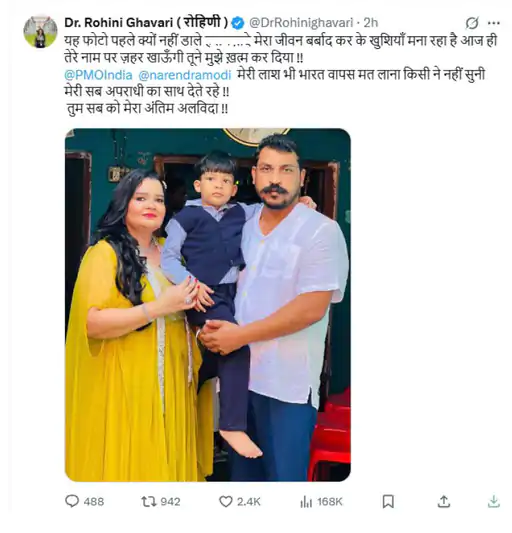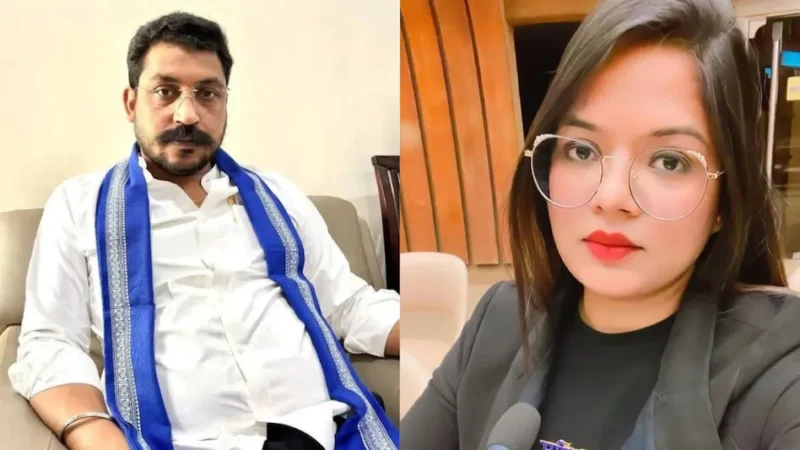
September 24, 2025, at 9:15 PM (IST): Rohini Ghawri, Indore-based Dalit PhD researcher and Ambedkarite activist, posted a distraught message on X (formerly Twitter), accusing Nagina MP and Bhim Army founder Chandrashekhar Azad of destroying her life and threatening to take her own. The post, directly addressed to the Prime Minister’s Office, shocked the nation. In a few hours, it was tweeted more than 50,000 times, trended as the top Indian hashtag, and turned what some saw as a personal crisis into a national discussion.
Once hailed for her inspiring path from the daughter of a sanitation worker to addressing the United Nations, Rohini now stood in the centre of a scandal — forcing India to confront tough questions of caste, gender, justice, and accountability.
From UN recognition to explosive charges, the Rohini Ghawri–Chandrashekhar Azad case reveals the collision of trust, betrayal, and political influence.
From Sanitation Worker’s Daughter to UN Recognition
Rohini’s journey had long been celebrated as a symbol of hope. Born into the Valmiki community in Indore, she grew up in modest circumstances. Her father was a sanitation worker — among India’s most stigmatized occupations, yet still carried out by over 1.2 million across the country, the overwhelming majority of whom were members of Dalit communities.
Her mother sold bits of family jewelry just to be able to keep her in school. These were symptoms of a larger fact about Dalit families: education is pursued at tremendous personal expense.
In 2019, Rohini’s life changed when she secured the ₹1 crore National Overseas Scholarship, one of the most competitive awards offered by the Government of India to Scheduled Caste and Scheduled Tribe students. Fewer than 100 scholars receive it each year out of thousands of applicants, making it a less than 1% acceptance rate.
The scholarship enabled her to pursue a PhD in Switzerland — and in the eyes of many, her achievement was living proof that India’s reservation system, which reserves 15% of government and educational seats for SCs, could propel marginalized students to global platforms.
Alongside academics, Rohini founded the Janpower Foundation, dedicated to Dalit empowerment and women’s rights. By 2023, her voice had reached the international stage. On the UN Human Rights Council (UNHRC), she delivered two speeches that became viral in India. She informed the 52nd session on March 15, 2023, that India’s democracy had enabled leaders such as President Droupadi Murmu, a tribal lady, and Prime Minister Narendra Modi, who hails from an OBC background, to be able to ascend to leadership positions.
“Good things also happen in India,” she said, while admitting caste issues. On September 13, 2023, at the 54th session, she said: “We Dalits adore our Constitution because it is that magic book which emancipated us from untouchability.” She further highlighted the success of ISRO’s Chandrayaan-3 mission, the first such mission in the world to land near the moon’s south pole, and gave credit to the women scientists who played a pivotal role.

Her words resonated not just for what they said, but for the speaker: a Dalit woman scholar who had previously existed at the margins of Indian society. Her speeches persuaded policymakers that India’s affirmative action programs were paying dividends, and hashtags like #1Cr generally honored her scholarship. News outlets declared her to be the “success story” of India’s reservation system.
Chandrashekhar Azad: The Dalit Icon
To understand why Rohini’s allegations against Chandrashekhar Azad carried such weight, one must see who Azad is. Popularly referred to as Azad or Ravan by his followers, he is the leader of the Bhim Army, founded in Uttar Pradesh to resist caste dominance. The movement claims to run over 1,000 free schools for Dalit children and is now a symbol of the strength of grassroots assertion.
Azad became popular by launching tough street protests aggressively, more so in western Uttar Pradesh, where he portrayed himself as a bold leader who would not settle for anything with caste chiefs or political parties.
His oratory was passionate, his public image uncompromising. In May 2024, he won the Lok Sabha seat of Nagina, UP, by defeating the BJP candidate by over 1.6 lakh votes. It was a milestone victory — evidence that Dalit militancy could be achieved independently of political voices outside the BSP. Among the followers, he is compared to Kanshi Ram and even B.R. Ambedkar.
To many Dalits, he has been a source of pride and self-respect in a structure where they have usually felt invisible. To opposition parties, he was an emerging ally, while to the ruling BJP, he was an irritant. His chaste image as a young, unaccommodating activist made him respected and feared.
That is why Rohini’s accusations didn’t just shock his supporters — they rattled the foundation of a political movement. If proven true, they would not only damage Azad’s personal credibility but could cast doubt on the moral authority of Dalit activism itself.
The Allegations: Love, Betrayal, and Exploitation
Rohini alleges that Azad formed a personal relationship with her under false promises of marriage while concealing his marriage. In her version, he emotionally manipulated her, sexually exploited her, and leveraged her international fame to enhance his political standing. When she demanded commitment, she alleges, he dumped her.
She posted videos supposedly featuring him on the ground, weeping and seeking forgiveness, and WhatsApp messages in which he fawned upon her. The videos soon went viral, being shared across Indian news networks and social media. What had possibly been a private spat now seemed to many to be proof of hypocrisy in a man who publicly proclaimed himself to be battling for dignity and justice.
By situating her own suffering in a larger pattern, Rohini shifted the narrative away from the individual. “This is not about me alone. This is about dignity — he trifled with the lives of many girls,” she announced, implying systemic exploitation rather than individual betrayal. To her advocates, it made her charges not only credible but representative of how even liberation movements are capable of perpetuating exploitation.
How the Scandal Unfolded
The controversy unfolded in stages throughout 2025.
In the early months of the year, Rohini began posting videos and chats on X, accusing Azad of deception. One clip showed him lying on the floor, crying for forgiveness. For many, it was a stunning reversal — the same man hailed as “Ravan” by supporters now caught in a moment of humiliation.
On 15 June 2025, around 3:00 PM, Rohini marched her protest to institutions. She went to the National Commission for Women (NCW) in New Delhi and also met the Delhi Police Commissioner on the same day. By taking an extra step beyond social media, she voiced her persistence and distrust that the police would act on their own.
By August 10, 2025, at 6:30 PM, she publicly announced that she had filed an FIR against Azad in Delhi. While registration was confirmed, nondisclosure of its details fueled suspicion that officials were shielding him.
The moment of reckoning came on the night of September 24, 2025, at 9:15 PM (IST), when she posted on social media: “Chandrashekhar has destroyed my life.” She blamed officials for ignoring her evidence, suspected institutions were shielding Azad, and begged that if anything happened to her, her body need not be returned to India. Within hours, the message spread like wildfire, catching fire and spreading scorn across the nation.
For Indians generally, the post was not so much an appeal for assistance but a denunciation of a system that cannot protect women, all educated and known worldwide.
Her mental health became a reason for concern. Anti-caste organizations in North America and Europe issued solidarity statements, urging Indian authorities to act with speed.
Azad’s Response: “This is a Conspiracy”
Azad quickly denied the allegations. Speaking on September 25, 2025, he said: “It’s completely false and politically motivated. It’s a conspiracy to defame our movement for Dalit rights.”
The Bhim Army supported this line of thinking, suggesting that his increased popularity and political clout made him a target for his detractors. For his proponents, the accusations were political, not moral — an effort to disarm Dalit assertiveness through an attack on its most prominent leader.
This framing divided public opinion sharply. Some saw it as an excuse to escape accountability; others believed it was plausible, given the long history of attempts to undermine Dalit leaders through scandal.
Authorities and the Law
The NCW confirmed receiving Rohini’s complaint but has not announced any recommendations. Rohini insists that an FIR had been registered on August 10, though specifics like IPC sections used are not yet revealed.
If charged, the case might include Section 376 (rape) with a maximum penalty of life imprisonment; Section 417/420 (cheating and fraud) punishable by 7 years; and Section 354 (outraging the modesty of a woman) punishable by 5 years.
Thus far, no court has ruled on a summons, no hearings, no judicial orders. The silence reflects how cases involving powerful politicians often stall at the investigation stage.
For many observers, this is the heart of the issue: institutions meant to protect survivors appear paralyzed when the accused holds political office.
Why the Case Matters
The implications go far beyond two individuals. Rohini embodies the possibilities created by India’s reservation system; Azad symbolizes Dalit assertion in politics. Her accusations against him force uncomfortable questions: when the oppressed gain power, do they sometimes reproduce the same abuses?
For women’s rights advocates, this is India’s #MeToo moment in politics. While the entertainment industry and media saw waves of allegations in 2018–19, political leaders largely escaped scrutiny. Rohini’s courage in naming an MP pierces that shield, exposing how even progressive spaces can remain patriarchal.
The case also tests institutions. If the NCW, Delhi Police, and courts fail to act, it will confirm fears that survivors — especially women from marginalized backgrounds — cannot rely on justice, no matter how educated or visible they are.
Internationally, the story complicates India’s image. Rohini once praised India at the UN for progress; now, her struggle is cited by diaspora groups and NGOs as proof that caste and gender injustices persist. This contradiction makes India’s narrative of empowerment harder to defend.
Political and Public Reactions
The reactions have been polarized. The UP Women’s Commission demanded action, with member Meenakshi Bharala saying: “If these charges are true, it questions his moral credibility as a parliamentarian.”
Political parties have been cautious, avoiding strong positions, but insiders suggest Azad could face suspension from Parliament if charges proceed. Among Dalits, opinion is split. Some call Rohini a brave whistleblower; others defend Azad as a victim of conspiracy.
On social media, the battle is fierce. By late September, hashtags like #JusticeForRohini and #StandWithAzad had crossed 1 million mentions, reflecting deep polarization. Abroad, Ambedkarite student groups and women’s rights NGOs issued open letters supporting Rohini and calling on Indian authorities to ensure her safety.
What Lies Ahead
The next steps will depend on institutions:
- The Delhi Police could release FIR details and summon Azad.
- The NCW may escalate the case to the Ministry of Women and Child Development.
- Courts could intervene under Section 156(3) CrPC if investigations stall.
- Parliament might face pressure to suspend Azad if charges are formalized.
- Rohini may seek recourse in higher courts or even international forums if ignored in India.
The results might vary from silent dismissal to a long trial that reconfigures Dalit politics. Either way, the case has already become a watershed moment for how India is addressing caste, gender, and power.
Important Clarification
This story is from complaints, statements, and social media posts by Rohini Ghawri between June and September 2025. No charges have been established in court. Chandrashekhar Azad and his supporters reject all accusations as politically motivated. The case is still under investigation by the authorities.
FOR MORE BLOGS – beyondthepunchlines.com

 Add to favorites
Add to favorites






